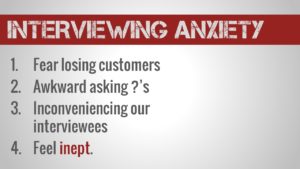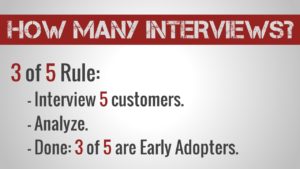
There were few things in my startup experience as uncomfortable as asking a potential customer how much they’d pay for an idea I’d become emotionally vested in. That discomfort inspired a number of excuses for not asking:
- They’ll think I only care about money/that I’m greedy.
- It doesn’t matter what they say, it won’t be accurate anyway (customers don’t know what they’ll pay).
- What if they say “nothing”?
So instead I would ask questions like:
- What do you think about…?
- Would you use…?
- I’d love to get your feedback on…?
While those questions provide interesting responses, there’s something special about, “How much would you pay for…?” – it uniquely triggers the “what would it take to open my wallet/write you a check” area of the brain that no other question does. I’ve found no other question to be as enlightening as this one.
So, after recognizing the value of the question, here’s how a typical conversation goes about Bounce.
Me: It’s an app that makes it easy to be on time. It knows exactly how long it’ll take to get to your next calendar appointment, taking into account the current traffic conditions, and notifies just before it’s time to leave.
Customer: Oh, cool! I’d could use that.
Me: Sweet! How much would you pay for it?
Customer: Oh, hmm. I dunno, $0.99?
Me: Would you pay $0.99/month for it?
Customer: Nah, I don’t like paying monthly for things.
Me: Makes sense. If you could choose in the app to pay $.99/month or $6.99 forever, would you pay $6.99?
Customer: Hmm. Yeah, if it worked. But I’d want to try it first.
Me: What if you had a month free and if after that, if it worked as you expected, would you pay $6.99?
Customer: Yeah.
This conversation has happened a dozen times and taught me a number of things:
- Anchor pricing works
- That half the people I talk to hate the idea of paying monthly for something
- The other half of the people I talk to think about $0.99/month the same way they think about $0.99 forever – it’s just not enough to worry about
While I’m not totally convinced folks will pay $6.99 for the app, I am convinced they’ll pay something. To figure out how much, we’ll be running our Kickstarter test.
Contrast the conversation above with one about another app I built:
Me: It helps long distance couples stay connected…by letting the guy remotely control his girl’s “personal massager” from anywhere in the world.
Customer: Ha! That’s awesome, I’m actually in a long distance relationships now.
Me: Oh, yeah? How much would you pay for it?
Customer: Me? Ah, nothing. We don’t do that kind of thing.
Almost everyone recognized the “value” of the app, but almost no one I talked to would actually pay for it.
Conclusion: growing a pair, distancing myself emotionally from my idea, and asking, “How much would you pay for…?” has dramatically improved the quality of information I have about products before I start building them.





Hi Justin, reading about the ToGetHer conversations I started wondering if people would pay extra for a “compatible massager”+app over the corresponding “equivalent massager” sans app. Have you tested for anything else other than selling the app independently?
I find this type of question leads to really bad conclusions. People are very very bad at predicting their own behavior.
I had one product where surveying people yielded >60% who would pay >$20 for the product, yet not one single person actually purchased it on a smoke test.
You might even think that you can get a good negative result here. Meaning that if NO ONE says they’ll buy, then probably no one will buy. But then again think of iTunes. At the height of Napster, it was unclear that anyone would pay for music ever again and the music companies were trying subscription models. But low and behold, iTunes let you buy music, easily and cheaply and people did. Would asking them directly reveal this? I’m very skeptical.
I would suggest trying subscription pricing anyway. A smoke test is easy enough to run once you have enough validation from Kickstarter.
Thanks Tristan. I’ve got to agree to some extent – this question isn’t a panacea. It, nor customer development at large, is going to get it right all the time. In fact, there are many cases where it will get it wrong – namely mind-melting products that change the way we behave.
Customer development, or “would you pay for/use” questions, wouldn’t have built Facebook, Twitter, or even the iPod. I wouldn’t have the first clue how to test the hypotheses those products are built on (e.g. “It’s like sending/getting hundreds of SMSs everyday, and no one reading any of them. You’d use that, right?”).
For companies that are solving problems we can wrap their heads around though, I think the question has value. If there are obvious barriers that are going to hinder someone from giving me money, that question will often times find them:
…are all things I’ve heard and raise red flags I may not have discovered otherwise.
Maybe there’s a hint there about why surveying people about purchasing intentions doesn’t work very well. The above are all conditionally positive answers, but to an educated interviewer, they’re positively negative.
I can imagine a survey taker who might respond with one of the above if asked in a interview, but on a survey they might feel inclined to gloss over the conditional part of their statement and simply guess how much the product is worth.
Would love to hear more about the survey – maybe there’s a way to understand why one of us has had bad results with the question, and the other good.
Great post! Thanks for sharing details. i find these kinds of conversations difficult as well for the reasons mentioned. I’ll be talking to potential customers during the coming week and will be sure to incorporate this advice into the conversations.